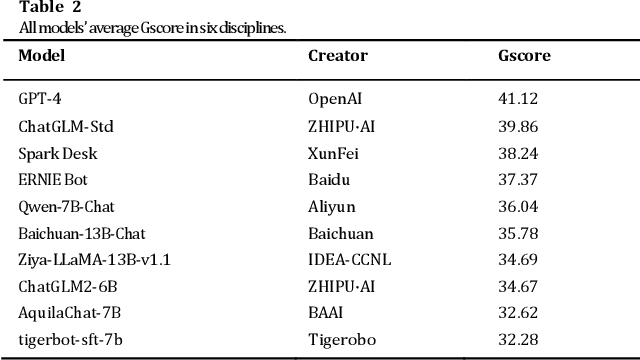Meng Hao
Evaluating the Generation Capabilities of Large Chinese Language Models
Aug 11, 2023


Abstract:This paper presents CG-Eval, the first comprehensive evaluation of the generation capabilities of large Chinese language models across a wide range of academic disciplines. The models' performance was assessed based on their ability to generate accurate and relevant responses to different types of questions in six disciplines, namely, Science and Engineering, Humanities and Social Sciences, Mathematical Calculations, Medical Practitioner Qualification Examination, Judicial Examination, and Certified Public Accountant Examination. This paper also presents Gscore, a composite index derived from the weighted sum of multiple metrics to measure the quality of model's generation against a reference. The test data and test results can be found at http://cgeval.besteasy.com/.
Dynamic GPU Energy Optimization for Machine Learning Training Workloads
Jan 05, 2022



Abstract:GPUs are widely used to accelerate the training of machine learning workloads. As modern machine learning models become increasingly larger, they require a longer time to train, leading to higher GPU energy consumption. This paper presents GPOEO, an online GPU energy optimization framework for machine learning training workloads. GPOEO dynamically determines the optimal energy configuration by employing novel techniques for online measurement, multi-objective prediction modeling, and search optimization. To characterize the target workload behavior, GPOEO utilizes GPU performance counters. To reduce the performance counter profiling overhead, it uses an analytical model to detect the training iteration change and only collects performance counter data when an iteration shift is detected. GPOEO employs multi-objective models based on gradient boosting and a local search algorithm to find a trade-off between execution time and energy consumption. We evaluate the GPOEO by applying it to 71 machine learning workloads from two AI benchmark suites running on an NVIDIA RTX3080Ti GPU. Compared with the NVIDIA default scheduling strategy, GPOEO delivers a mean energy saving of 16.2% with a modest average execution time increase of 5.1%.
 Add to Chrome
Add to Chrome Add to Firefox
Add to Firefox Add to Edge
Add to Edge